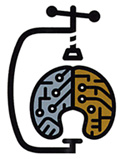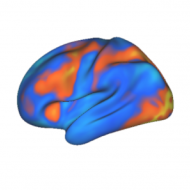 Most neuroscience writing touts statements like 'the human brain is the most complex object in the universe'. This serves only to paint the brain as a mysterious, seemingly unknowable structure.
Most neuroscience writing touts statements like 'the human brain is the most complex object in the universe'. This serves only to paint the brain as a mysterious, seemingly unknowable structure.
This is somehow comforting to some, but it's not for me. I want to understand this thing!
Here are some facts to demystify the brain (most points courtesy of Dave Touretzky and Christopher Cherniak):
- The brain is very complex, but not infinitely so
- A few spoonfuls of yogurt contain 1011 lactobaccillus bacteria: ten times the number of cortical neurons in a human brain
- There are roughly 1013 synapses in cortex. Assume each stores one bit of information: that’s 1.25 terabytes.
- To put this in perspective, this 2.0 terabyte hard drive is readily available and costs less than $900.
- Also, the Library of Congress (80 million volumes, average 300 typed pages each) contains about 48 terabytes of data.
- Volume of the human brain: about 1.4 liters.
- Number of neurons in a human brain: 1012. Number of neurons in a rat brain: 1010.
- Number of neurons in human spinal cord: 109 [source]
- Average loss of neocortical neurons = 1 per second; 85,000 per day; ~31 million (31×106) per year [source]
- No neuron fires faster than 1 kHz
- The total energy consumption of the brain is about 25 watts [source]
- Average number of glial cells in brain = 10-50 times the number of neurons [source]
- "For all our neurocomputational sophistication and processing power, we can barely attend to more than one object at a time, and we can hardly perform two tasks at once" [source]
What to take from all this? Simply that the brain is a real, physical object with real, physical limitations. As such, we really do have a chance to understand it.
Of course, if the brain is so limited, how can we expect our brains to be up to the task of understanding it?
We can, and we will. How can I be so sure? Because (as illustrated above) we have already built, and thus understand, computational devices that are rivaling and in some cases surpassing (e.g., in memory capacity) the computational powers of the brain.
This shows that we have what it takes to understand ourselves in the deepest way possible: by learning the neural mechanisms that make us who and what we are.
-MC

Leave a comment